Today’s Current Affairs: 26th Jan 2024 for UPSC IAS exams, State PSC exams, SSC CGL, State SSC, RRB, Railways, Banking Exam & IBPS, etc
Table of Contents
Kaushal Bhawan : Inaugration
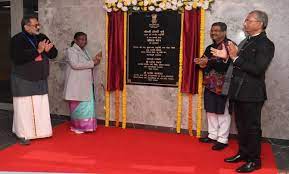
President of India, Smt Droupadi Murmu inaugurated Kaushal Bhawan.
- On the occasion, the President visited the exhibition stalls set up by the beneficiaries of various initiatives of the Government such as PM Vishwakarma, PM JANMAN, Skill Acquisition and Knowledge Awareness for Livelihood Promotion (SANKALP), Pradhan Mantri Kaushal Vikas Yojana (PMKVY) and interacted with them.
- Kaushal Bhawan located in New Delhi .
- Kaushal Bhawan is a new building of the Ministry of Skill Development and Entrepreneurship .
- Its foundation stone was laid in March 2019.
- It will provide office space for the Ministry as well as its associated organisations the Directorate General of Training, the National Council for Vocational Education and Training and the National Skill Development Corporation.
- This state-of-the-art office building, equipped with modern facilities and infrastructure .
- It has been built with the aim of providing a safe, convenient and efficient work environment to usher in new work culture and give a fillip to Skill India Mission.
Nayagarh Kanteimundi Brinjal:
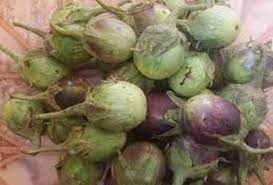
Nayagarh Kanteimundi Brinjal got GI Tag.
- Nayagarh Kanteimundi Brinjal is known for its prickly thorns on the stems and the whole plant.
- The green and round fruits contain more seeds as compared to other genotypes.
- It is famous for its unique taste and relatively short quick cooking time.
- The plants are resistant to major insects and can be grown with minimal pesticide.
- It is being widely cultivated in Nayagarh district of the state.
- The growers are getting a yield of up to 200 quintals per hectare and selling at around Rs 60 per kg.
- Historical records also suggest that the locals got the brinjal from the hilly areas.
- They collected seeds from it and started raising seedlings nearly 100 years ago.
GIFT IFSC:

Gujarat International Finance Tech-city (GIFT) SEZ is India’s first International Financial Services Centre (IFSC).
- The Government allowed the direct listing of securities by public Indian companies on International Exchanges of GIFT IFSC.
- In pursuance of the announcement on July 28, 2023, by Union Minister for Finance and Corporate Affairs Smt. Nirmala Sitharaman to enable direct listing of Indian Companies at GIFT- IFSC exchanges in the first phase, the Department of Economic Affairs (DEA), Ministry of Finance, has amended Foreign Exchange Management (Non-debt Instruments) Rules, 2019, and notified the ‘Direct Listing of Equity Shares of Companies Incorporated in India on International Exchanges Scheme’.
- GIFT IFSC is the maiden international financial services centre of India that connects India with global opportunities.
- It aims to attract the top talent in the country by providing the finest quality of life.
- It enables the Indian economy to connect with the global financial system and allows a seamless and easy flow of global capital into India.
- It aspires to cater to the dynamic development needs of GIFT IFSC, the unified statutory regulatory authority, the International Financial Services Centres Authority (IFSCA) has taken significant steps in accelerating global sustainable capital flows by providing an agile and world-class regulatory and business environment in GIFT IFSC.
- GIFT IFSC aspires to become India’s gateway for inbound and outbound requirements of international financial services.
Amrit Dharohar Capacity Building Scheme:
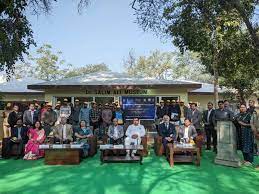
The Central government is spearheading a significant transformation in the realm of wetland tourism with the ‘Amrit Dharohar Capacity Building Scheme’.
- This initiative, launched in June 2023, aims to revolutionize tourism practices at ecologically-sensitive wetlands, particularly Ramsar sites like Odisha’s Chilika Lake and Haryana’s Sultanpur Bird Sanctuary.
- Amrit Dharohar Capacity Building Scheme is a collaborative effort between the Ministry of Tourism and the Ministry of Environment, Forest, and Climate Change.
- The scheme will be implemented over the next three years (2023 onwards) to encourage optimal use of wetlands, and enhance biodiversity, carbon stock, eco-tourism opportunities and income generation for local communities.
- The primary focus of the Scheme is to strategically transition from high-volume tourism to high-value nature tourism at ecologically-sensitive wetlands.
- The aim is to enhance livelihood opportunities for local communities through harnessing the nature-tourism potential of the Ramsar Sites across the country.
- The scheme is being implemented in convergence with various Central Government ministries and agencies, State wetland authorities, and a network of formal and informal institutions and individuals, working together for a common cause.
- Out of 16 identified Ramsar sites, five have been selected for pilot projects under the scheme.
- These pilot sites include Sultanpur National Park (Haryana), Bhitarkanika Mangroves (Odisha), Chilika Lake (Odisha), Sirpur (Madhya Pradesh), and Yashwant Sagar (Madhya Pradesh).
- Training programs for participants are carried under the Alternative Livelihood Programme (ALP) (a 30 hours/15 days training programme) and Paryatan Navik Certificate (boatman certification for tourism).
Asian Buddhist Conference For Peace:
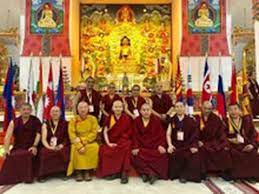
The Asian Buddhist Conference for Peace (ABCP), a voluntary mass movement of Buddhists in Asia convened its 12th General Assembly in New Delhi.
- Theme: ABCP – The Buddhist Voice of Global South, reflects India’s commitment, as demonstrated through its G20 presidency and the Voice of Global South Summit.
- Role of India was highlighted in developing the Buddhist circuit and establishing the India International Centre for Buddhist Culture.
- Emphasis was placed on the depiction of Lord Buddha in the artwork of the Indian Constitution, specifically in Part V, where he is featured in the section on Union governance.
National Voters Day 2024:

Election Commission of India is celebrating 14th National Voters’ Day (NVD) on 25th January 2024
- National Voters’ Day (NVD) has been celebrated on January 25 every year since 2011, across the country to mark the foundation day of the Election Commission of India, i.e. 25th January 1950.
- The main purpose of the NVD celebration is to create electoral awareness amongst citizens and encourage them to participate in the electoral process.
- Dedicated to the voters of the country, the National Voters’ Day is also used to facilitate enrolment of voters, especially the newly eligible young voters.
- New voters are felicitated and handed over their Elector Photo Identity Card (EPIC) in the NVD functions held across the country.
- NVD is celebrated at the national, state, district, constituency and polling booth levels, which makes it one of the largest celebrations in the country.
- NVD 2024 theme – ‘Nothing Like Voting, I Vote For sure’
- On January 25, 2024, the Election Commission of India celebrates its 75th year of service to the Nation.
Adoption Of Climate Smart Agriculture:

The adoption of climate-smart agriculture (CSA) faces challenges in South Asia, as sustainable practices and technologies struggle to gain widespread acceptance.
- CSA, or Climate-Smart Agriculture, is an approach that incorporates a set of agricultural practices and technologies.
- Its goals are to boost productivity (e.g., precision farming, smart crops), enhance resilience (e.g., zero budget natural farming, agroforestry), and reduce greenhouse gas emissions (e.g., zero tillage, permaculture, organic farming).
Climate-Smart Agriculture Practices:
- Cultivating Climate-Resilient Crop Varieties: Growing crops resistant to temperature changes, pests, and diseases.
- Example: Drought-tolerant maize in sub-Saharan Africa benefits smallholder farmers.
- Conservation Agriculture: No-till and reduced-tillage cultivation for soil coverage,
- Agroforestry: Integrating trees and shrubs with crops and livestock.
- Precision Irrigation: eg: Drip and sprinkler irrigation maximize water use efficiency.
Disease X:

The World Health Organisation (WHO) emphasised the urgent need for global preparedness against a potential new pandemic, referred to as ‘Disease X’
- Disease X is referred to as a hypothetical pathogen or threat that can cause a major pandemic in future.
- It could be a new agent, a virus, a bacterium, or a fungus without any known treatment.
- The term coined by scientists and the World Health Organization could be any of the 25 families of viruses that have the capability to cause illness in people.
- Disease X was included in the WHO’s updated Blueprint list of diseases back in 2018.
- Scientists are of the opinion that Disease X could be 20 times more deadly than SARS-Covid virus that caused pandemic recently.
- It represents an illness which is currently unknown but could pose a serious microbial threat to humans in the future.
Halwa Ceremony : Before The Annual Budget Presentation
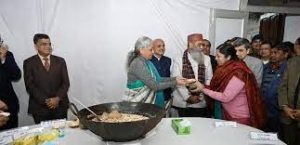
The Union Finance Minister participated in the ‘Halwa Ceremony’ recently, a tradition observed before the annual budget presentation.
- Halwa Ceremony is a tradition performed every year ahead of the budget and signifies the official initiation of the printing process of various documents related to the budget.
- It involves the preparation of the traditional dessert ‘halwa’ in a massive kadhai (wok), which is then served to all those who are directly associated with the budget-making process.
- The finance minister gives the go-ahead by stirring the kadhai and serving the sweet to officials.
- It takes place in the basement of the Finance Ministry’s North Block in Central Delhi, where a special printing press is located.
- It serves as a formal ‘send-off’ for the ministry officials and staff engaged in preparing the Union government’s annual financial statement.
- Subsequently, the top officials involved with the budget enter a designated ‘lock-in’ period, isolating themselves within the ministry premises and cutting off from their families to preserve the confidentiality surrounding the final budget document.
- The officials are required to stay in the Finance Ministry till the finance minister finally presents the budget.
Grantham Inscriptions:

A team of archaeologists recently discovered two stone inscriptions of ‘Grantham’ and Tamil dating 11th and 16th centuries respectively at Pazhnchervazhi village near Kangayam.
- Grantha is an important historical script that was once used to write Sanskrit throughout South East Asia and greater Tamil Nadu.
- The word Grantha denotes in Sanskrit ‘a literary work’. Evidently, the script used for writing the Sanskrit works obtained the same name.
- At one time, it was prevalent throughout South India.
- When the Malayalam language began to freely borrow words as well as the rules of grammar from Sanskrit, this script was adopted for writing that language and was known as Arya Ezhuthu.
- Both Grantha and Tamil scripts appear alike in modern forms.
- The evolution of both scripts from Brahmi was also more or less similar.
- The development of the Grantha script in Tamil Nadu may be divided into four periods.
- The archaic and ornamental, the transitional, the mediaeval, and the modern.
- Archaic and ornamental variety is commonly known as Pallava Grantha. Mahendravarman’s Tiruchirapalli rock cut cave and other cave temple inscriptions, Narasimhan’s Mamallapuram, Kanchi Kailashnath, and Saluvankuppam temple inscriptions, Mutharaiyar’s Senthalai inscriptions are examples of this variety.
- The transitional variety of Grantha inscriptions roughly belong to three centuries between 650 CE and 950 CE.
- Later Pallavas (Nandivarman’s Kasakudi, Udayendram plates, etc.) and Pandyan Nedunjadaiyan’s Anaimalai inscriptions are examples of this.
- The mediaeval variety dates from about 950 CE to 1250 CE.
- Inscriptions of the imperial Cholas of Thanjavur are examples of this.
- The modern variety belongs to the later Pandyas and Vijayanagar periods.
- It was popular in Tamil Nadu until the early 20th century.
- After the introduction of printing machines, many Sanskrit books transcribed from palm leaves were printed in Grantha script.
- After Independence, the popularity of Hindi in Deva Nagari script influenced all printing works, and Grantha script went out of vogue.
Default Bail:

The Supreme Court recently held that default bail cannot be claimed on the ground that the investigation is pending against other accused.
- The Code of Criminal Procedure (CrPC) provides for three kinds of bail. Section 438 provides for Anticipatory Bail; Section 439 provides for Regular bail whereas Section 167(2) provides for default/statutory bail.
- Default bail, also known as statutory bail, is a type of bail which accrues as a right to an accused detained in custody, when the police fail to or are unable to complete the investigation and file the chargesheet within the time frame stipulated under the law.
- When a person is arrested under any section of any act, there is an obligation on the arresting authority to complete the investigation within a specified time.
- This period is mandatory, and not obligatory.
- The statutory time frame for completing the investigation of offences under the IPC, and for filing of the charge sheet varies depending on the gravity of the offence.
- For offences punishable with imprisonment up to 10 years, the investigation must be completed within 60 days of arrest.
- For offences punishable with death, imprisonment for life, or imprisonment for more than 10 years, the investigation must be completed within 90 days of arrest.




